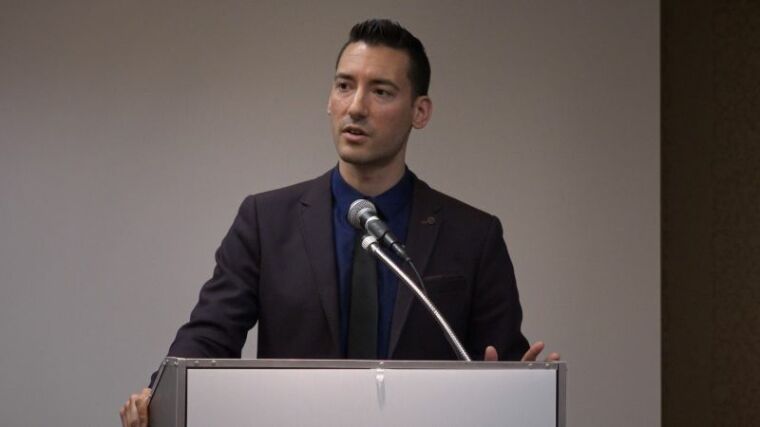Ninth Circuit court backs David Daleiden in baby parts investigation case against university

The Ninth Circuit Court of Appeals has overturned a lower court ruling that barred undercover journalist David Daleiden from obtaining unredacted records from the University of Washington, which is being suspected of trafficking fetal remains.
Last year, David Daleiden sought to obtain public records from the University of Washington's Birth Defects Research Laboratory regarding its use of aborted baby body parts in research, as well as its relationship with the abortion provider Planned Parenthood.
However, university employees and abortion facility personnel filed a lawsuit in district court to block certain information from the records. The plaintiffs argued that they would "likely face threats, harassment and violence" if information about their work was disclosed to the public.
Last November, a Seattle-based district court judge ruled in favor of the university, barring Daleiden from releasing the names and job titles of university personnel involved in the research using fetal remains.
On Monday, however, a three-judge panel from the Ninth Circuit Court unanimously ruled in favor of Daleiden, overturning the lower court decision that prevented him from obtaining unredacted public records.
"Although we agree with the district court that there may be a basis for redaction where disclosure would likely result in threats, harassment, and violence, the court's order did not address how the Doe plaintiffs have made the necessary clear showing with specificity as to the different individuals or groups of individuals who could be identified in the public records," the ruling stated.
"The district court also made no finding that specific individuals or groups of individuals were engaged in activity protected by the First Amendment and what that activity was," it continued.
Thomas More Society Special Counsel Peter Breen, told Fox News earlier this week that Monday's ruling "prevented a serious threat to the public's right to know how their tax dollars are being spent."
According to Breen, Daleiden had specifically requested the names and personal contact information of the people involved to be stricken from the documents before they were handed over. However, abortion advocates and government employees also wanted to censor entity names, job titles and departments within the university, a move which Breen says would render the documents "useless for investigative purposes."
The Ninth Circuit remanded the case back to the lower court, saying it had failed to provide facts and law sufficient to make a "clear showing" that the U.S. Constitution requires heavy censoring of the public records.
Daleiden has found himself fighting multiple legal battles after he released a series of undercover videos showing Planned Parenthood employees allegedly profiting from the sales of aborted baby body parts.
In January 2016, Daleiden and his colleague Sandra Merritt were indicted in Texas for filming medical providers without their consent, but all charges were dropped seven months later.
 Christians don't have to affirm transgenderism, but they can’t express that view at work: tribunal
Christians don't have to affirm transgenderism, but they can’t express that view at work: tribunal Archaeology discovery: Medieval Christian prayer beads found on Holy Island
Archaeology discovery: Medieval Christian prayer beads found on Holy Island Presbyterian Church in America votes to leave National Association of Evangelicals
Presbyterian Church in America votes to leave National Association of Evangelicals Over 50 killed in 'vile and satanic' attack at Nigerian church on Pentecost Sunday
Over 50 killed in 'vile and satanic' attack at Nigerian church on Pentecost Sunday Ukrainian Orthodox Church severs ties with Moscow over Patriarch Kirill's support for Putin's war
Ukrainian Orthodox Church severs ties with Moscow over Patriarch Kirill's support for Putin's war Islamic State kills 20 Nigerian Christians as revenge for US airstrike
Islamic State kills 20 Nigerian Christians as revenge for US airstrike Man who served 33 years in prison for murder leads inmates to Christ
Man who served 33 years in prison for murder leads inmates to Christ


 Nigerian student beaten to death, body burned over ‘blasphemous’ WhatsApp message
Nigerian student beaten to death, body burned over ‘blasphemous’ WhatsApp message 'A new low': World reacts after Hong Kong arrests 90-year-old Cardinal Joseph Zen
'A new low': World reacts after Hong Kong arrests 90-year-old Cardinal Joseph Zen Iran sentences Christian man to 10 years in prison for hosting house church worship gathering
Iran sentences Christian man to 10 years in prison for hosting house church worship gathering French Guyana: Pastor shot dead, church set on fire after meeting delegation of Evangelicals
French Guyana: Pastor shot dead, church set on fire after meeting delegation of Evangelicals ‘Talking Jesus’ report finds only 6% of UK adults identify as practicing Christians
‘Talking Jesus’ report finds only 6% of UK adults identify as practicing Christians Mission Eurasia ministry center blown up in Ukraine, hundreds of Bibles destroyed: 'God will provide'
Mission Eurasia ministry center blown up in Ukraine, hundreds of Bibles destroyed: 'God will provide' Church holds service for first time after ISIS desecrated it 8 years ago
Church holds service for first time after ISIS desecrated it 8 years ago Burger King apologizes for 'offensive campaign' using Jesus' words at the Last Supper
Burger King apologizes for 'offensive campaign' using Jesus' words at the Last Supper Uganda: Muslims abduct teacher, burn him inside mosque for praying in Christ’s name
Uganda: Muslims abduct teacher, burn him inside mosque for praying in Christ’s name